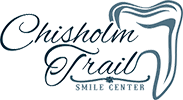If you are missing all or many of your teeth, you may be wondering, “What type of dentist does dentures?” Since dentures are a common restorative dentistry option, most dental practitioners can provide these prosthetics. However, not every dentist offers the same quality in terms of aesthetics and functionality. Further, not all dentists offer advanced implant-supported dentures. That is why, when you are looking for a suitable dental practice, it is vital that you choose a practitioner with experience in cosmetic dentistry and functional aesthetics.
At Chisholm Trail Smile Center, Dr. Matthew Bridges offers several types of dentures, including implant-supported restorations. Additionally, he has undergone advanced training in Predictable Esthetics and Functional Occlusion. Contact us to learn more about our dentures and how Dr. Bridges’ specialized education makes him an outstanding choice for your restorative needs.
Traditional Dentures
When you think of dentures, you likely picture traditional removable restorations. There are two types of traditional dentures. The first, full dentures, will replace all of your teeth. You could receive an upper denture for your top teeth, a lower denture for your bottom teeth, or both at the same time. Partial dentures may be appropriate if you still have some remaining healthy teeth.
Both full and partial traditional dentures have a gum-colored plastic base that fits over the alveolar ridge. The synthetic teeth maintain the natural alignment of the bite. Furthermore, they will match any remaining natural teeth. Denture adhesive can help to keep both types in place. Partial dentures also have small clasps that help keep the prosthetic connected to the adjacent natural teeth.
Implant-Supported Dentures
In recent years, implant-supported dentures have become a more common way to replace missing teeth. These state-of-the-art restorations offer greater stability than traditional dentures, and they also provide important health benefits.
Implant-supported dentures are attached to small titanium implant posts. The dental implants integrate with the jawbone, essentially replacing missing tooth roots. In this way, they can uphold a new dental restoration. Plus, they can also help to regenerate bone tissue. This will reduce the risk of jawbone recession, a common side effect of tooth loss. Once your jaw has healed from implant surgery, your dentist can attach your denture. This type of restoration is permanently fixed in your mouth to fully restore your oral function with no dietary restrictions or embarrassing slippage.
How to Choose a Dentist for Dentures
If you are researching dentures, you are not alone! The need for these restorations is incredibly common. The American College of Prosthodontists estimates that 36 million Americans are missing all their teeth, and these numbers are expected to rise in coming years. Furthermore, in a multinational study, 19% of the population in 19 countries wears some form of denture.
Once you know what type of dentist does dentures, it is important to find the right dentist for your needs. Look for someone who:
- Has plenty of experience with dentures and other dental restorations
- Demonstrates a good track record of beautiful, functional results
- Possesses experience in cosmetic dentistry, in additional to restorative treatments
- Has advanced dental training
- Is a leader in his or her field
- Is dedicated to personalized care and detailed follow-up treatments
Dr. Matthew Bridges meets all of the above requirements. His training in Predictable Esthetics means that he can provide stunningly lifelike results when designing dental prosthetics. Furthermore, thanks to his education in Functional Occlusion, he plans dentures that maintain a balanced bite and jaw health. Most importantly, he is committed to each of his patients as individuals. Along with his team, he wants to make everyone feel comfortable and fully informed about their treatment process.
Learn More about What Type of Dentist Does Dentures
To learn more about dentures and to find a dental practice for your restorative needs, contact our Duncan, OK, office online today. You can also reach us by calling 580-255-4880.







